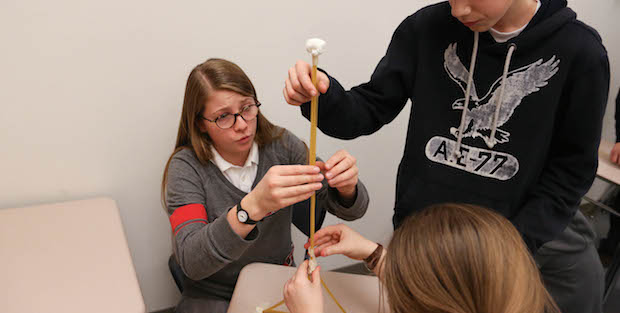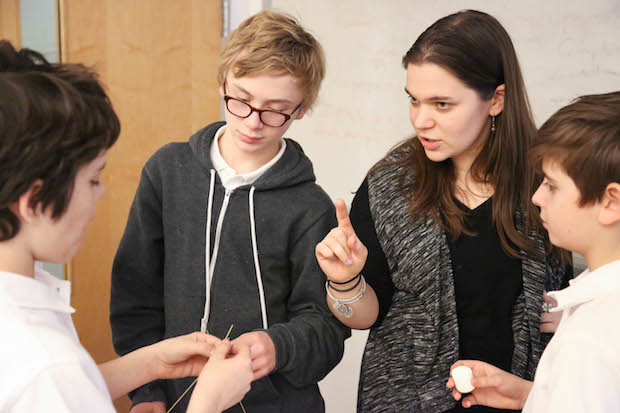The goal of computer programming club is to foster interest in computer science and provide students with a foundation of skills as they explore their interests in programming, engineering, and design. During the year, students work on projects that harness their collaboration, creative problem solving, and critical thinking skills such as this one: the Marshmallow Challenge. As a team, the club works to foster a community in which out-of-the-box thinking is welcome and encouraged, and students are free to ask questions and explore their interests in computer science. Here is Jennifer Lavalle telling us what is the Marshmallow Challenge, an activity that touches upon each of the 5 C’s (communication, collaboration, critical thinking, creativity and contemplation), a skill set which the Lycée has identified as key to student success both inside and outside of school.
Jennifer Lavalle, Secondary Technology Integrator at the Lycée Français de New York.
The Marshmallow Challenge is a team building activity made popular by Tom Wujec on a TED Talk (see below) called Build a Tower, Build a Team. The objective is to work with a team create the tallest free standing structure using nothing but 20-30 pieces of spaghetti and about 5 feet of tape; the structure must hold one marshmallow on the top. The study described by Wujec shows how different groups of people approach this problem solving activity and the success they experience based their approaches. The amusing finding is that kindergarten students perform better than most adult professionals; the question becomes: why?
In Computer Programming Club, we work collaboratively to foster a team spirit such that everyone feels that they can share and participate openly, without fear of “getting the wrong answer.” Learning to code requires trial and error and collaborating with other people to help achieve a goal. Therefore, I thought the Marshmallow Challenge would be an appropriate vehicle to discuss both collaboration techniques and the design process. Additionally, computer programming lessons can often be very dense and full of text and time on screen. Sometimes taking students offline and having them engage in a hands-on activity with real world objects helps them understand the concepts in a more meaningful way.
There are two main skill sets that are necessary to successfully accomplish the challenge. First, collaboration. When placed in a group, given the materials, and told to build the structure, the group must immediately begin working together to solve the problem. Communication is key here – successful groups develop an idea, test the idea, develop a new idea and iterate from there, as Y6 student Vivian F. explains in this video.
“Des barres beaucoup plus solides”
That leads me to the second skill set, incremental design. Like with many things in life, we rarely get it right the first time. It takes practice and testing in order to perfect a design. Students learn that they must quickly test their idea to see if it will hold a marshmallow before committing to certain choices and wasting materials/supplies.
This activity was the launch of a new phase of club during which students will participate in group projects. They will create projects based on their interests. Computer science is a very broad field and there are many roles that individuals play within it, so students will be given the option to create different projects based on what aspect of computer science interests them most. For example, some students will be focusing on graphic design and how storytelling, animation, and computational thinking relate to one another. Other students will be growing skills in Front End web development by designing websites about their interests. Finally, other students will be focusing on a particular programming language of their choice in order to develop an understanding of how to use code to achieve a goal or solve a problem. Yet, no matter the project, students will be working through the design process and collaborating closely.
About the Author :
Originally from the Boston area, Jennifer Lavalle earned a bachelor’s from New York’s Fordham University in Communication & Media Studies and French Language & Literature. She holds a master’s in technology, innovation and education from the Harvard Graduate School of Education, where she became passionate about using the power of technology to create meaningful learning opportunities for all students.


